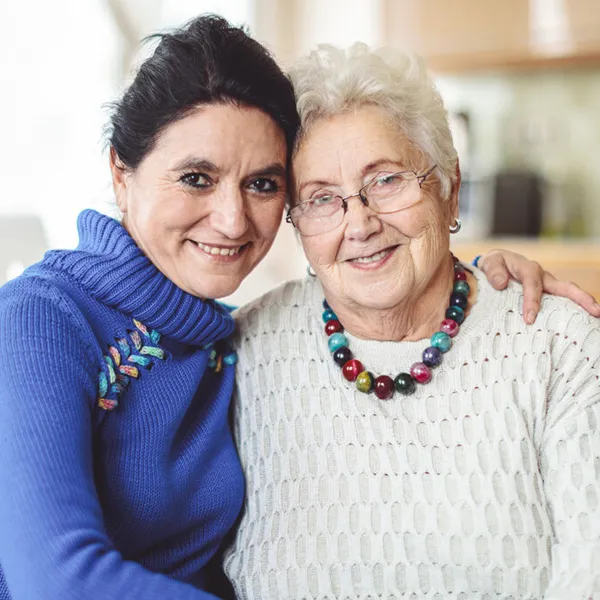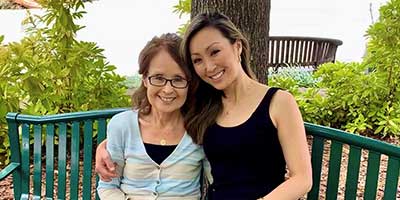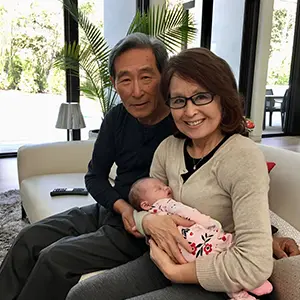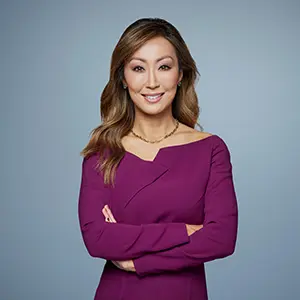
Your Gift Can Make 2x the Impact
Your Gift Can Make 2x the Impact
A gift can go twice as far during our February $100,000 2x Match. Your contribution by Feb. 27 will fuel Alzheimer’s research and help provide essential care and support.
Donate NowQ&A with CNN’s Amara Walker: “My Family’s Alzheimer's Journey Has Helped Me Appreciate What I Have”
Amara, you penned a post for our blog in May of 2022. Can you talk about what has changed with your mom since then?
I’ll be honest. I’m heartbroken. The last few months have been especially difficult. Lately, I find myself grappling with so many emotions: guilt, fear, anxiety and sadness.
 The progression of Alzheimer’s is like a low burning flame. Once the flame grows into a raging fire, everything around it gets engulfed and destroyed quickly. Since I wrote that blog [in 2022], my mom has declined considerably. Two years ago, my mother was living at home with my dad, her main caregiver. She was playing piano multiple times a day and was also able to walk without assistance. Even though she was in the moderate stage, the disease was leading her to have regular angry outbursts. My elderly father was struggling to provide the care she needed. He was cooking every meal and taking care of her hygiene, all of which was a big challenge.
The progression of Alzheimer’s is like a low burning flame. Once the flame grows into a raging fire, everything around it gets engulfed and destroyed quickly. Since I wrote that blog [in 2022], my mom has declined considerably. Two years ago, my mother was living at home with my dad, her main caregiver. She was playing piano multiple times a day and was also able to walk without assistance. Even though she was in the moderate stage, the disease was leading her to have regular angry outbursts. My elderly father was struggling to provide the care she needed. He was cooking every meal and taking care of her hygiene, all of which was a big challenge.
I just returned from visiting my mother in California in April, and she is now bed-bound at a nursing home. She suffered a complication before Christmas, which ultimately landed her in skilled nursing.
She doesn’t recognize me at all anymore. But I am able to still see glimpses of her. During this visit, I sang some of her favorite hymns and for a few seconds she danced with her shoulders. At one point she tried to sing along. She also smiles in some rare moments. I will always take what I can get.
Receiving an Alzheimer’s diagnosis in a family is never easy. What was receiving that news like for you?
In 2019, I was slapped in the face with the reality that my mom undeniably had dementia when I was on a trip to South Korea with my mom and dad. I’ll never forget exactly where I was and what I was eating when my mom asked, “Who are your parents?” I was inconsolable. Crushed. I had been in denial up to that point.
We finally received an official diagnosis at UC Irvine in 2021. It had a sobering effect on me. Particularly when the doctor showed me my mom’s brain scans and the locations of the dark spots where her brain was essentially dying off. It triggered me to start planning for the future rather than being paralyzed by my grief. I’m relieved we got most of my mom’s legal documents in order because it will be one less decision to face, when the time comes.
You’ve spoken about the challenges/barriers that your family has faced in finding Korean resources and care facilities? Can you talk about those challenges?
 There are so many layers to the difficulties that immigrant families face when navigating Alzheimer's. Firstly, there are cultural barriers. It was challenging to convince my dad to put my mother in a home. Traditionally, elderly Koreans often move in with their adult children. Family always takes care of family. No matter the sacrifice. But I think that mindset is evolving. There should be no shame in placing a loved one in a home to help the non-ailing partner survive and hopefully thrive. With the progression of Alzheimer's, I have witnessed how hard it is to properly care for the person living with the disease. Oftentimes, it becomes dangerous for the caregiver. Then there is the language barrier. My mother lost all of her English language skills and reverted to her mother tongue during the course of the disease. I was able to find a handful of Korean-speaking facilities near my parents, but to be honest, I was really unhappy with the care they provided. Our choices were limited. Now that my mother is in an advanced state, I'm focused on finding caregivers for her who are passionate about what they do.
There are so many layers to the difficulties that immigrant families face when navigating Alzheimer's. Firstly, there are cultural barriers. It was challenging to convince my dad to put my mother in a home. Traditionally, elderly Koreans often move in with their adult children. Family always takes care of family. No matter the sacrifice. But I think that mindset is evolving. There should be no shame in placing a loved one in a home to help the non-ailing partner survive and hopefully thrive. With the progression of Alzheimer's, I have witnessed how hard it is to properly care for the person living with the disease. Oftentimes, it becomes dangerous for the caregiver. Then there is the language barrier. My mother lost all of her English language skills and reverted to her mother tongue during the course of the disease. I was able to find a handful of Korean-speaking facilities near my parents, but to be honest, I was really unhappy with the care they provided. Our choices were limited. Now that my mother is in an advanced state, I'm focused on finding caregivers for her who are passionate about what they do.
You’ve talked previously about how this journey with your mom has brought your family closer. How so?
My family is not the most emotionally expressive but we are fiercely committed to taking care of each other. Although, I should mention, my mother was my emotional safe space. I always felt comfortable turning to her for anything. Through all the difficult decisions we have had to make, from the medical to financial, I always felt like my dad and my brother had my back and that we were in lockstep with next steps with my mother. In every decision, my brother and I put my mother and father first. We have always embraced our duties to our parents, to take care of them, after all that they sacrificed for us. When I look back, we have never really disagreed or argued over my mom's care. Sometimes, family hardship drives families apart. My family’s Alzheimer's journey has helped me appreciate what I have.
You are a daughter and mother yourself. How do you plan to spend this Mother’s Day?
I definitely cherish my time with my children (ages 3 and 6) as I've seen how short my time with my own mother has been. I show them photos of my mother in her better times, which I often do lately. They still have memories of her and I want to keep those memories alive until they become parents themselves and pass those memories on to their children.
For Mother's Day, our plan is to be home. Together. Is there anything better than that?
Do you have a message of hope for other families who share this journey?
 It’s okay to be overwhelmed with sadness and even hopelessness. It’s normal to feel like you're in a constant state of mourning. I am.
It’s okay to be overwhelmed with sadness and even hopelessness. It’s normal to feel like you're in a constant state of mourning. I am.
But I ask that you do one thing. Find one good friend, relative, colleague or spouse, who you can truly lean on through the good days and bad days. It’s okay to be open about your struggles. That has opened the door for me to connect with others who are coping with the same disease. I have one dear friend who has been through a similar journey with her mother and sharing our struggles has been a tremendous help to me.
Last but not least: Hope is the Alzheimer's Association. They are truly making a difference in how we talk about the disease, support the millions of caregivers who feel unseen, and how we treat people living with Alzheimer's. I have hope because of the passion and dedication of the Alzheimer's Association, and that will lead to a cure.
About: Korean-American journalist Amara Walker is co-anchor of CNN This Morning Weekend on CNN & CNN International, and anchor of CNN Newsroom on Max.
In addition to being an Alzheimer’s Association Champion, Amara speaks out against anti-Asian violence. Follow her on Instagram and Twitter.
